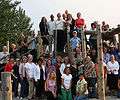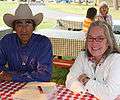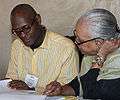National Writing Project
The National Writing Project (NWP) is a United States professional development network that serves teachers of writing at all grade levels, primary through university, and in all subjects. The mission of the NWP is to improve student achievement by improving the teaching of writing and improving learning in the nation's schools.
About
Mission
The National Writing Project focuses the knowledge, expertise, and leadership of our nation's educators on sustained efforts to improve writing and learning for all learners.
Vision
Writing in its many forms is the signature means of communication in the 21st century. The NWP envisions a future where every person is an accomplished writer, engaged learner, and active participant in a digital, interconnected world.
Who
Unique in breadth and scale, the NWP is a network of sites anchored at colleges and universities and serving teachers across disciplines and at all levels, early childhood through university. The NWP network provides professional development, develops resources, generates research, and acts on knowledge to improve the teaching of writing and learning in schools and communities.
The National Writing Project believes that access to high-quality educational experiences is a basic right of all learners and a cornerstone of equity. NWP works in partnership with institutions, organizations, and communities to develop and sustain leadership for educational improvement.
Network of sites
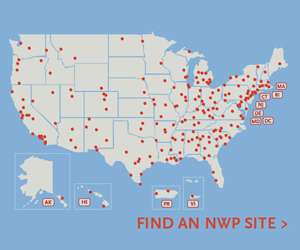
The more than 200 local sites[1] that make up the NWP network are hosted by universities and colleges. Co-directed by faculty from the local university and from K–12 schools, local sites serve all 50 states, the District of Columbia, Puerto Rico, and the U.S. Virgin Islands. Sites work in partnership with area school districts to engage lead teachers and faculty in developing high-quality professional development programs for educators. NWP continues to add new sites each year, with the goal of placing a writing project site within reach of every teacher in America. The network now includes two associated international sites.
Local resources
NWP sites share a national program model,[2] adhering to a set of shared principles and practices for teachers' professional development, and offering programs that are common across the network. In addition to developing a leadership cadre of local teachers (called "teacher-consultants") through invitational summer institutes, NWP sites design and deliver customized inservice programs for local schools, districts, and higher education institutions, and they provide a diverse array of continuing education and research opportunities for teachers at all levels.
National research studies[3] have confirmed significant gains in writing performance among students of teachers who have participated in NWP programs.
The NWP is the only federally funded program that focuses on the teaching of writing. Support for the NWP is provided by the U.S. Department of Education, foundations, corporations, universities, and K-12 schools.
Core principles
The core principles at the foundation of NWP's national program model are:
- Teachers at every level—from kindergarten through college—are the agents of reform; universities and schools are ideal partners for investing in that reform through professional development.
- Writing can and should be taught, not just assigned, at every grade level. Professional development programs should provide opportunities for teachers to work together to understand the full spectrum of writing development across grades and across subject areas.
- Knowledge about the teaching of writing comes from many sources: theory and research, the analysis of practice, and the experience of writing. Effective professional development programs provide frequent and ongoing opportunities for teachers to write and to examine theory, research, and practice together systematically.
- There is no single right approach to teaching writing; however, some practices prove to be more effective than others. A reflective and informed community of practice is in the best position to design and develop comprehensive writing programs.
- Teachers who are well informed and effective in their practice can be successful teachers of other teachers as well as partners in educational research, development, and implementation. Collectively, teacher-leaders are our greatest resource for educational reform.
History
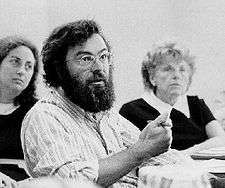
NWP began in 1974 in the Graduate School of Education at the University of California, Berkeley, where, James Gray and his colleagues established a university-based program for K–16 teachers called the Bay Area Writing Project (BAWP).[4]
Gray, a teacher educator and former high school English teacher, was motivated to create a different form of professional development for teachers, one that made central the knowledge, leadership, and best practices of effective teachers, and that promoted the sharing of that knowledge with other teachers.
In partnership with Bay Area school districts, BAWP created a range of professional development services for teachers and schools interested in improving the teaching of writing and the use of writing as a learning tool across the curriculum. The structure of this first writing project site's programs formed the basis of NWP's "teachers-teaching-teachers" model of professional development.
By 1976, the NWP had grown to 14 sites in six states. Over the next 15 years, the network continued to grow, with funding for writing project sites made possible by foundation grants and matching funds from local sources. In 1991 NWP was authorized as a federal education program, allowing the network to expand to previously under-served areas. With its core grant from the U.S. Department of Education, supplemented by local, state, and private funds, it reached the goal of the NWP site within reach of every teacher in the nation. Following federal budget cuts in 2010 and 2011, several of the projects were forced to close or reduce numbers of summer participants.[5]
Historical resources
In NWP founder James Gray's memoir, he looks back on the early years, describing the mentors who influenced him, how he refined the model, and the difficulties he overcame to gain widespread support for the project.
One important factor in the NWP's longevity is the complementary role played by foundations, as Anne Lieberman traces in her chapter from Reconnecting Education and Foundations: Turning Good Intentions into Educational Capital.
References
External links
NWP website
NWP programs
- NWP National Programs
- English Language Learners Network
- Rural Sites Network
- Teacher Inquiry Communities
- Technology Liaisons Network
- Urban Sites Network
- Local Site Research Initiative
- National Reading Initiative
- New-Teacher Initiative
- Project Outreach
- Technology Initiative
- Directors Retreat
- E-Anthology
- New-Site Leadership Initiative
- Professional Writing Retreats
- State and Regional Networks
- Vermillion Literary Project Magazine
